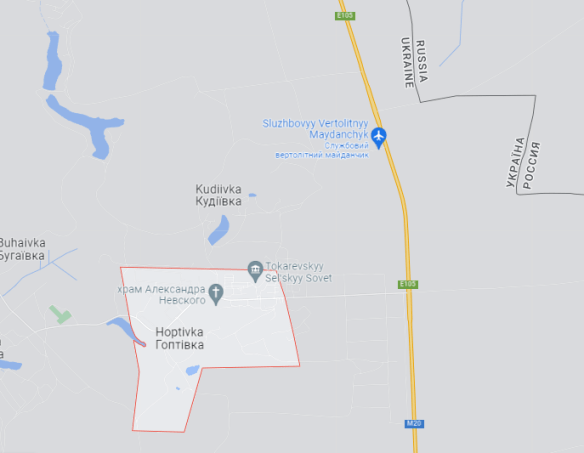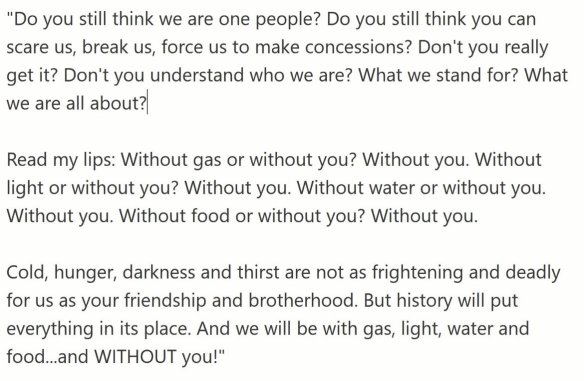Some Republican lowlife actually said the unindicted co-conspirator who leads their cult was, unlike Biden, “tough on Russia”. (Shamelessness is their superpower). Jonathan Chait of New York Magazine reminds us of what happened on planet Earth:
On February 25, the day after Russian tanks rolled into Ukraine, Lee Smith published an essay in Tablet arguing that Ukraine had brought on its problems. Smith, a house stenographer for Representative Devin Nunes and the author of two pro-T____ books, unburdened himself of a long list of Ukrainian provocations. In 2014, Ukraine’s people rejected Vladimir Putin’s generous offer to remain a Russian dependency and voted out his handpicked presidential candidate. A few years later, Ukrainian Americans accused Russia of hacking Democratic emails and extorting Volodymyr Zelenskyy — the guilt for which, in Smith and Putin’s view, was shared by the country their parents had fled. These defiant actions “reinforced Putin’s view that, especially in partnership with the Democrats, Ukraine did not understand its true place in the world as a buffer state.” The invasion was a terrible shame, conceded Smith, but this is what happens when a country has the temerity to offend Putin and T____ and assert its independence.
Putin’s war with Ukraine is being fought to settle a single question: Does his neighboring state have the right to make its own democratic decisions or must it subsist as a Russian vassal?
President Biden’s marshaling of a strong and united European response has thrown into sharp relief the contrast with his predecessor’s “America First” bluster. But there is an even more fundamental contrast between Biden’s multilateralism and T____’s nationalism, one that goes beyond diplomatic skill to core ideology: Many corners of the American right, including D____ T____, agree with Putin’s position.
Putin views a democratic Ukraine as an existential threat to his regime for two very good reasons. First, Ukraine’s majority prefers economic integration with Europe rather than Russia. Second, all strongmen are mainly preoccupied with maintaining power, and the existence of prosperous democracy in a neighboring country is a dangerous counterexample.
Twenty years ago, there was no significant reservoir of opposition to Ukrainian independence and democracy. The burgeoning alliance between Russian nationalists and America Firsters was set in motion when Paul Manafort went to work for the pro-Russian Party of Regions in Ukraine in 2004. Manafort, once one of the most powerful Republican lobbyists in Washington, had begun a globetrotting career selling his services to dictators. His Ukrainian client, Viktor Yanukovych and the Party of Regions, was Putin’s main organ for maintaining control of his neighboring country.
Putin nurtured a cadre of pliant Ukrainian oligarchs and functionaries who served a devious double purpose. They would faithfully weaken Ukrainian democracy on his behalf, and then he could turn around to the outside world and hold up Ukraine’s corruption as a justification for why it should not be treated like a real country.
He paired this with a slowly escalating campaign of violence. Putin and his allies would violently intimidate their political opposition to prevent them from gaining control of Ukraine. In 2004, Putin’s agents poisoned Viktor Yushchenko, the pro-western presidential candidate. (This occurred four years before the United States invited Ukraine to join NATO, a sequence that shows Russia’s threats against Ukraine drove its interest in joining the alliance, rather than the reverse, as Putin and his defenders have suggested.) Ten years later, Manafort’s client unleashed snipers and thugs to drive away peaceful protesters before a democratic revolution forced him to flee the country. After Russophiles lost control of Ukraine’s government, Putin started using militias to seize chunks of territory.
At the tail end of the Obama administration, both Democrats and Republicans supported democratization, westernization, and reform in Ukraine. When the Obama administration pressured Ukraine to fire ineffective prosecutor Viktor Shokin — a key step forward for advancing the rule of law in Ukraine — a bipartisan letter commended its efforts and did not draw any significant domestic opposition.
T____’s rise introduced to the Republican Party a figure who shared Putin’s perspective toward Ukraine and often echoed his propaganda. When Putin ginned up demonstrations in eastern Ukraine as a pretext to hive off chunks of land in 2014, T____ gushed, “So smart, when you see the riots in a country because they’re hurting the Russians, Okay, we’ll go and take it over … You have to give him a lot of credit.” After winning the nomination, T____ promised to consider recognizing Putin’s land seizure because “the people of Crimea, from what I’ve heard, would rather be with Russia than where they were.”
T____ brought on Manafort to run his campaign, which further linked Ukraine’s conflict with Russia to the American domestic struggle. Ukrainians released a “black book” of evidence of secret payments by the previous, pro-Russian regime, which implicated Manafort in an embezzling scandal for which he was eventually convicted. After it hacked Democratic emails and released them to aid T____’s candidacy, Russia claimed it had been framed by Ukraine. T____ subsequently endorsed this theory. (“They brought in another company that I hear is Ukrainian-based,” he told the Associated Press a few months after taking office. “I heard it’s owned by a very rich Ukrainian; that’s what I heard.”)
T____, of course, was impeached the first time for pressuring Zelenskyy to smear Biden, and his motive was primarily to gain an advantage over his opponent. But he also had clearly absorbed Putin’s idea that Ukraine was corrupt and undeserving of sovereignty. T____ regularly flummoxed his staff by insisting Ukraine was “horrible, corrupt people” and “wasn’t a ‘real country,’ that it had always been a part of Russia, and that it was ‘totally corrupt,’” the Washington Post reported. (The element of Russian propaganda here is not the claim that corruption exists in Ukraine, which is true, but the premise that this somehow destroys its claim to sovereignty or justifies subjugation to its far more corrupt neighbor.)
By the end of T____’s presidency, the distinction between his agenda in Ukraine and the Russian agenda in Ukraine was difficult to discern. In the aftermath of T____’s first impeachment, Rudy Giuliani inherited Manafort’s role as a liaison to the pro-Russian elements in Ukraine’s polity. In his travels through the country, Giuliani linked up with Party of Regions apparatchiks as well as known Russian intelligence agents, ginning up business proposals and allegations to fling against Biden. T____’s agents, Russian agents, and pro-Russian Ukrainian apparatchiks were speaking in almost indistinguishable terms.
That view of the world is expressed cogently, if chillingly, in Smith’s essay depicting Ukraine as a tool of the joint enemies of Putin and T____. And it has bled widely into the conservative mind. In the run-up to the 2020 election, numerous right-wing pundits warned darkly that American liberals were fomenting a “color revolution” akin to the pro-democratic uprisings that had broken out against several of Putin’s vassal states. Both their narrative and their diction depicted pro-democracy activists as a sinister cabal and Putin their innocent victim.
By the outset of Russia’s invasion, pro-Putinist rhetoric was common. “Ukraine, to be technical, is not a democracy,” asserted Tucker Carlson. “And by the way, Ukraine is a pure client state of the United States State Department.” To be sure, this view remained a minority on the right — and just as many of T____’s most fervent supporters recoiled at the January 6 insurrection, even many Putin defenders conceded a full-scale invasion went too far. Still, Putin’s claims against Ukraine have received endorsements from both the right’s most popular politician and its most popular media personality. That is not nothing.
It remains to be seen whether the Biden administration’s combination of sanctions, diplomacy, and military aid will be enough to save Ukraine from the predations of its neighboring dictator. The military odds remain favorable to Russia. But as Putin’s militarized irredentism grows larger on the world stage, an increasingly relevant consideration in American politics is the fact that only one American party truly disagrees with it.


You must be logged in to post a comment.